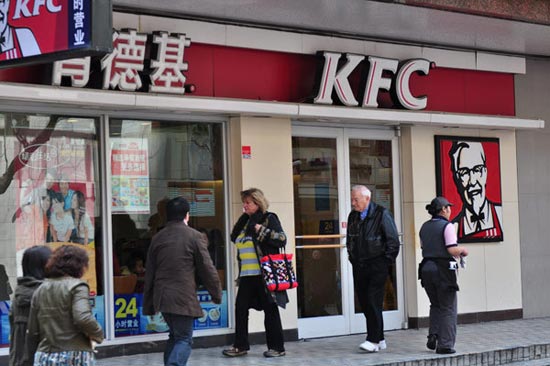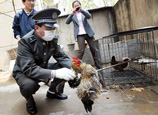
 |
| A KFC restaurant in Shanghai. According to the US-based fast food giant, its same-store sales in March declined an estimated 13 percent in China. Provided to China Daily |
Yum Brands Inc, the owner of KFC and Pizza Hut restaurants, said sales in its largest overseas market will see a steep dive as a result of bird flu scares.
According to the Louisville, Kentucky-based fast food giant, its same-store sales in March declined an estimated 13 percent in China. This included an estimated decline of 16 percent at KFC and 4 percent growth at Pizza Hut in the country.
"Within the past week, publicity associated with avian flu in China has had a significant, negative impact on KFC sales," the world's largest restaurant company by number of outlets said in a filing to US Securities and Exchange Commission on Wednesday.
"Yum is having a difficult time, which will undermine its decade-long robust sales and profit growth in China," said Feng Enyuan, secretary-general of China Cuisine Association.
But Feng said the negative impact on Yum and its KFC stores will not last long as prevention and treatment measures improved.
"Based on past experience, as bird flu has already hit twice in the country, the negative impact on the catering industry would last around six months," said Bian Jiang, assistant director of China Cuisine Association.
But this was not the beginning of Yum's business decline in China.
In February, Yum said its fourth-quarter profits dipped 5 percent to $337 million in the three months to Dec 29. Its same-store sales in China declined 6 percent in the quarter, following media reports that excessive amounts of antibiotics had been used by some of KFC's former chicken suppliers in China.
China is Yum's most lucrative market. According to its third quarter report, China accounted for more than half of its overall revenue of $3.57 billion, and the country also generated around 40 percent of Yum's profit.
Since opening its first KFC branch on the Chinese mainland in 1987, Yum has nearly 5,000 restaurants in more than 800 Chinese cities.
"Historically in these situations, we have educated consumers that properly cooked chicken is perfectly safe to eat, and we will continue to do so," the fast-food giant said in the filing.
Bian suggested that Yum "promote some localized food options in order to get through this difficult period, such as fried shrimps or mushroom dishes".
Industry experts said some local restaurants are taking poultry dishes off the menu in response to the health scare, such as the famous baizhanji, sliced cold chicken, and kaoruge, roasted pigeon.
"Canceling chicken-related dishes is not a one-size-fits-all solution for the bird flu outbreak," said Feng. "I suggest restaurants try to introduce more dishes with seafood or vegetables."

















 Homemade submarine, deep pockets | Also See: Incredible inventions by Chinese
Homemade submarine, deep pockets | Also See: Incredible inventions by Chinese


![]()
